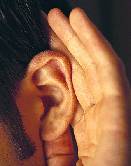
MONDAY, Nov. 14 (HealthDay News) — Hearing loss affects about one-fifth of Americans aged 12 and older, a far higher number than previously believed, researchers report.
They examined data from people whose hearing was tested during National Health and Nutritional Examination Surveys (NHANES) from 2001 to 2008.
Based on the World Health Organization’s definition of hearing loss (unable to hear sounds of 25 decibels or less in the speech frequencies), the NHANES data showed that 12.7 percent (30 million people) of the U.S. population aged 12 and older had hearing loss in both ears and 20.3 percent (48 million people) had hearing loss in at least one ear.
Previous estimates put the numbers at 21 million to 29 million.
This new study also found that rates of hearing loss nearly doubled with every decade of age, and that women and blacks were significantly less likely to have hearing loss at any age.
It’s not clear why women and blacks are less likely to experience hearing loss, study leader Dr. Frank Lin said in a university news release.
Lin is an assistant professor with dual appointments in both the department of otolaryngology-head & neck surgery at the Johns Hopkins School of Medicine and in the department of epidemiology at the Johns Hopkins Bloomberg School of Public Health.
It may be that the female hormone estrogen and the melanin pigment in darker skin could have a protective effect on the inner ear, which Lin and colleagues plan to investigate in future studies.
Lin said the findings of this study, published Nov. 14 in the journal Archives of Internal Medicine, will help research into hearing loss and its potential consequences such as cognitive decline, dementia and poor physical functioning.
“This gives us the real scope of the problem for the first time and shows us how big of a problem hearing loss really is,” Lin said.
More information
The American Speech-Language-Hearing Association has more about hearing loss.

